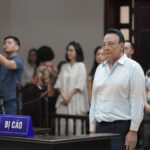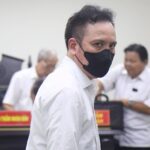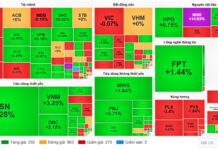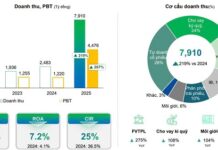In addition, there was one victim out of 6,600, Ms. Pham Thi T., who appealed and requested an increased sentence for Mr. Dung.
Prior to this, the Hanoi People’s Court sentenced Mr. Dung to eight years in prison.
The first-instance verdict determined that due to financial difficulties, the defendant, Mr. Dung, had agreed upon and directed his son, Do Hoang Viet, and the other defendants to mobilize capital by issuing private enterprise bonds.
The defendants utilized three companies—Ngôi Sao Viet, Soleil, and Cung Dien Mua Dong—to fabricate non-existent economic activities through fictitious contracts, such as stock purchases and investment cooperation. They also collaborated with several auditing firms to embellish their financial reports to meet the requirements for bond issuance. Subsequently, they signed fictitious contracts for bond transfers and engaged in money laundering to create a fictitious value for the bonds, ultimately defrauding more than VND 8,643 billion.
REQUEST FOR A REDUCTION IN SENTENCE BY 6-9 MONTHS
At the appellate court, Mr. Dung argued that from the beginning, he had no intention of appropriating assets but rather raised funds through bonds to invest in projects.
“I have spent over 900 days in prison, and my age is advancing. Meanwhile, Tan Hoang Minh needs to continue its business operations to repay bank loans and interest to investors. I humbly request the court to reduce my sentence so that I can continue contributing to the corporation and society. Tan Hoang Minh has numerous ongoing projects, and if I do not return soon, a significant amount of assets will be wasted,” pleaded Mr. Dung.
Investor Pham Thi T. stated that she purchased Tan Hoang Minh’s bonds with a one-month maturity, and the funds for this purchase were gathered from her friends. However, five days after buying the bonds, Mr. Dung was arrested, rendering the bonds worthless. As her friends pressured her to repay their investments, she had to borrow VND 2 billion. The lender sued her, and in addition to repaying the principal, she also had to compensate for interest amounting to VND 400 million.
The victim argued that the defendants had caused her significant economic and health-related damages. Therefore, she appealed the entire verdict and requested an increased sentence for Mr. Dung, as she believed the eight-year sentence was not sufficiently deterrent. In addition to the principal amount, Ms. T. also demanded that Mr. Dung compensate her for the interest.
In response to the victim’s appeal, Mr. Dung expressed his respect for the court’s decision.
Mr. Dung explained to the court that these bond issues were backed by assets. In the first plan, the value of the collateral was 1.5 times the amount of the bond issuance.
Tan Hoang Minh had entered into contracts with several units to manage these assets.
A representative of Tan Hoang Minh elaborated on the asset management contracts, which included asset management fees and account management fees. The company had submitted a request to the investigating agency and the court to retrieve the assets but had not received a response, as they were awaiting the final judgment.
The representative mentioned that Tan Hoang Minh had paid service fees amounting to VND 48 billion. The company expressed its intention not to pay additional fees for the remaining asset management services. Regarding the amount already paid, the company had no objections.
The representative of the Procuracy stated that the first-instance court’s conviction of Mr. Dung for “appropriating property by fraud” was accurate in terms of the person and the crime, and there was no miscarriage of justice.
Considering the appeals of the defendant and the victim, the Procuracy found that the nature of the crime committed by the defendant was particularly serious, and he played the most critical role in the case. The defendant had committed the crime multiple times. Additionally, Mr. Dung had several mitigating circumstances, and many victims had submitted petitions requesting leniency for him. Taking into account the three mitigating circumstances, the first-instance court’s decision to sentence Mr. Dung to eight years in prison was well-founded and appropriate.
At the appellate court, the defendant submitted additional documents revealing that he was undergoing treatment for stomach cancer…
Based on the above grounds, the Procuracy proposed to reject the victim’s entire appeal. Simultaneously, they recommended accepting the request for a reduced sentence for Mr. Dung, suggesting a reduction of 6-9 months in his prison term.
ATTORNEY’S PLEA FOR A DEFINITIVE RESOLUTION TO THE CASE
Mr. Dung’s attorney, Nguyen Van Tu, argued that regarding the damages, the Hanoi Department of Civil Judgment Enforcement had fully compensated all investors (except for the sole victim who appealed).
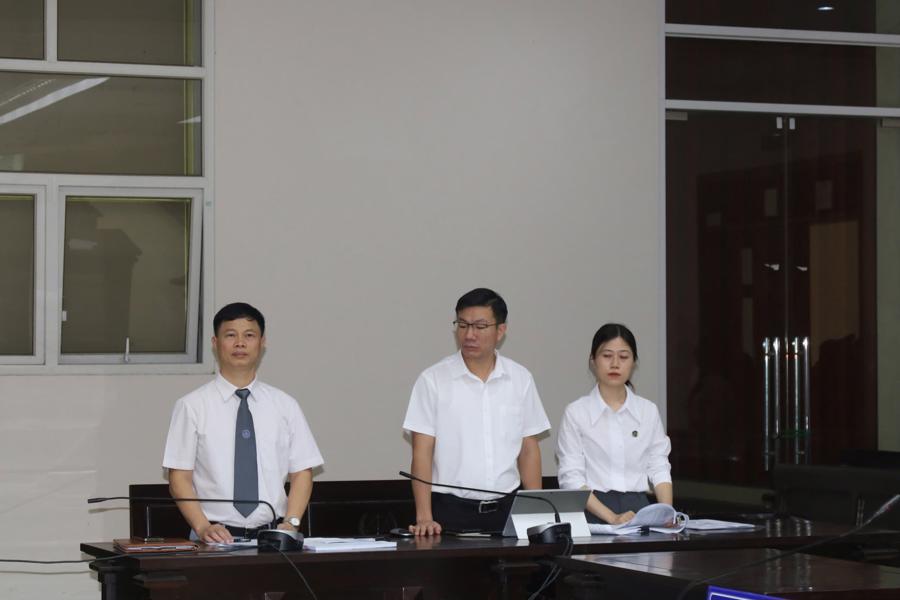
If there hadn’t been a hiccup in verifying the victim’s information, restitution could have been made as early as the investigation stage. Thus, the damages have been comprehensively addressed.
Mr. Dung acknowledged that this incident taught him an expensive lesson, as he hadn’t thoroughly researched the applicable laws. During his lengthy detention, he has been a model inmate.
Given the extended duration of his pre-trial detention, totaling nearly 1,000 days, Attorney Tu requested a three-year reduction in Mr. Dung’s sentence.
Regarding civil liability, Attorney Tu argued that the bond issues were backed by assets, and the State Securities Commission had canceled them due to their illegality. The first-instance court also concluded that the acts constituted a criminal offense. Overall, these acts were in violation of the law.
If the original transaction is deemed invalid, then any related transactions are also considered invalid, including those related to bond issuance, such as valuation, asset management, and account management. Some transactions have been fully executed, such as valuation and advisory services for bond issuance.
For the transactions that have not been completed, Attorney Tu argued that in the case of asset management, the managing party received the necessary documents and fees, but in reality, these expenses had not yet materialized. Although Tan Hoang Minh had transferred a portion of the funds, the company requested that they not be required to pay the remaining amount. A similar situation occurred with the account management fees.
According to the Civil Code, if the company has fully compensated the victims, the latter must return the company’s documents.
The attorney expressed his hope that the Panel of Judges would incorporate this content into the verdict, facilitating a comprehensive resolution for all parties involved.
Addressing the court, Mr. Dung shared, “This has been an extremely painful lesson for me.”
“As I navigate the ups and downs of life, I yearn to move past this chapter for the sake of my family. My company, which once employed over 2,000 staff members, now has just over 100. It has been a challenging journey. I have contributed significantly to society, and I earnestly beseech the court to grant me a lighter sentence so that I may return to my family sooner. My children are incapable of steering a large corporation such as ours.
We have weathered numerous storms to build and preserve our brand, and according to media reports, our projects have doubled in value. I implore the Panel of Judges to consider this matter from a holistic perspective and impose the lightest possible sentence upon me, as an eight-year term would be exceedingly burdensome,” Mr. Dung concluded.
The Tan Hoang Minh Group Chairman’s Sentence Reduction Request: A Plea for Leniency
The prosecution acknowledged that Mr. Do Anh Dung has made significant contributions to society and that his family has taken steps to rectify the consequences of the case. They have requested a partial consideration of the defendant’s appeal.
Former Department Head Scams Tan Hoang Minh Chairman Out of 80 Billion VND; Faces 20 Years in Prison
The prosecution alleges that Nguyen Sy Ta, the former head of the Ethnic Minorities Committee’s Department of General Affairs, deceived Do Anh Dung, the chairman of the Tan Hoang Minh Group, into transferring 80 billion VND as a deposit for the Dao Nui Cuong project in Quang Ninh province. Nguyen then allegedly embezzled these funds for his personal use.



